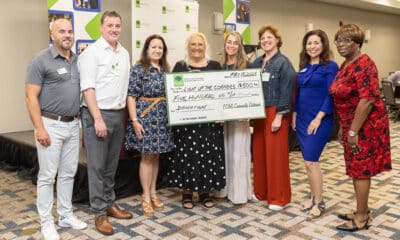Business
Prime Lunchtime with the City Manager: Smart City Expo, Curiosity Lab, the city’s first craft brewery and more.
Published
6 years agoon
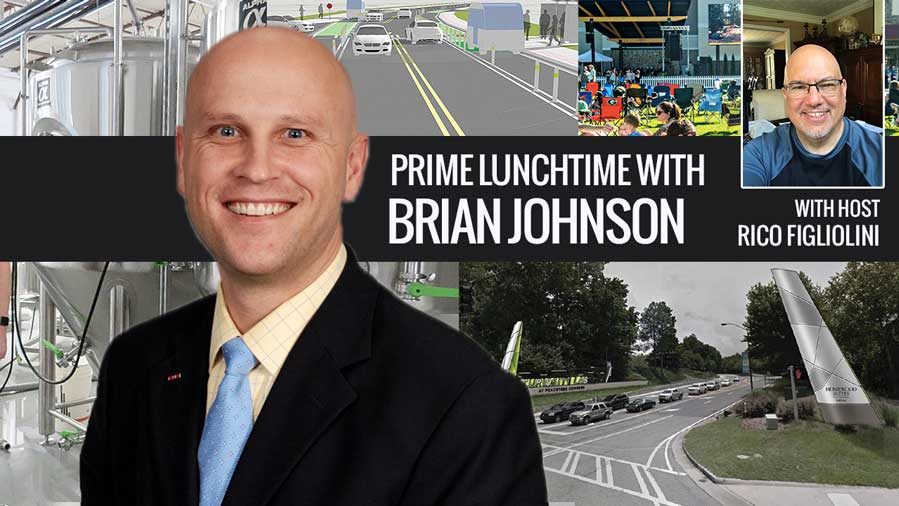
This podcast also includes information about hosting a special event for the first day of the Smart City Expo Atlanta 2019, the opening of the city’s first craft brewery, upcoming developments in the city and the city’s response to urban camping.
About Smart City: “It won’t be long until, literally, you could be walking down the street and your phone’s talking to the cars driving by, talking to the phones of other pedestrians, talking to the buildings, talking to the light pole. I mean – it’s a both amazing and sometimes scary environment we’re going to be in.”
On the Chattahoochee River (Fiserv) development: “So it’s a very complicated site both from an environmental standpoint, as well as because of its sheer size, there’s a lot of, you know, back of house negotiations that the master developer has to do with lining up the team that’s going to develop it. Because this is a mix of uses, so you’ve got different contractors that specialize in different types of housing.”
On expanding the Town Green: “Essentially, the eastern side is currently in development. The city owns it, and we have wanted the town green to be activated and to watch kind of how it’s playing out, and take feedback from our citizens on what we could do on that six acres to be a value add to the town green. So that discussion will be happening over the next three to six months…”
Transcript of the podcast:
Rico [00:00]: Hey! This is Rico Figliolini, host of Prime Lunchtime with Brian Johnson, city manager. We do this every month, and we have great discussion of all things going on here in the city on Peachtree Corners. Before we start, Brian, do you mind saying hi?
Brian [00:15]: Oh absolutely!
Rico [00:16]: Excellent. So a couple of sponsors. So first off, Prototype Prime, which is – we’re using the studio here – the podcast studio we’re at. They incubate here in the city Peachtree Corners, which is part of the Curiosity Lab at Peachtree Corners.
Brian [00:30]: It is. Curiosity Lab is really three things. It’s a mile and a half-intelligent mobility and smart city laboratory which has an autonomous vehicle test track. It’s a 25,000 square foot technology incubator. And it’s all the technology within both the building and the one and a half mile for you to test anything from drones to, you know, autonomous, you know, vehicles to on the uh, you know, to smart city connected vehicle. I mean, anything you could think of.
Rico [01:03]: So, this place has grown since I’ve been doing this podcast. This is unbelievable growth over the next few months than we’ve probably seen. Companies coming here from all over, not only the metro area, but the country and the world. We’re gonna be on the map. Peachtree Corners will be known, hopefully as well as Atlanta in some ways. So Prototype Prime, Curiosity Lab, sponsor of the podcast. And also want to thank a new sponsor that’s coming on – Gwinnett Medical Center. They’re now going to be insuring Peachtree Corners. You can learn more about their premier services. They’re gonna be conveniently located where the old Ippolito’s Restaurant used to be, and people know where that is. That’s the shopping center south of the QT on that side of the road on Peachtree Parkway. So they’re entering. They’re going to be having first-rate primary care services and specialty services. You can find out more about that at gwinnettmedicalcenter.org/PTC. So that out of the way, there’s just a lot to talk about.
Brian [02:03]: Sure there is!
Rico [02:05]: And in fact, the third sponsor on the radio – we’re a media sponsor – Peachtree Magazine. Peachtree Corner Magazine. Smart City Expo, Atlanta. So that’s just the – let’s start off with that.
Brian [02:16]: Sure!
Rico [02:16]: It’s such a huge thing.
Brian [02:19]: It is.
Rico [02:18]: You were in Barcelona last year. This is the first big expo on the North American continent for this.
Brian [02:24]: So, the Smart City Expo World Congress is the largest Smart City conference in the world. And, annually, it’s in Barcelona, and it has 35 to 40,000 attendees. And it got so big that they decided to create regional, kind of affiliate or feeder ones. You know, they have an Asian one, a European one, and the North American one, which started this year because of the work that Metroland and Chamber and others did. We are lucky enough to have the very first North American version here in Atlanta. And then, given that it was here, we were able to, um, kind of brief the powers that be about what Curiosity Lab is, and they were like, “Wow! We’re doing a Smart City conference and you have this living laboratory for Smart City testing and demonstration. Let’s make it an official demonstration site.” So we’re also a partner of Smart City Expo, and we’re going to be a demonstration site the morning the conference begins which is September 11th.
Rico [03:29]: Right. Three day weekend. Three day conference. And it’s the first of three years that they’re going to do this in such a place. And the whole idea is to be able to, not only show off Smart City IMT, you know, Internet and Memory Thing – Internet talking tower thing. Um, but it’s also to bring it down to a more usable level for the common man and woman. And how sustainability, smart technology, how it affects everyone.
Brian [03:58]: Right?
Rico [03:59]: Right, not just corporations.
Brian [04:00]: No, we’re at the cusp of really – the way we do, you know, anything, changing because of the ability to have, you know – to create that internet of things, which is everything being able to communicate with everything else. And we’re, you know, especially with 5G rolling out, we now have a wireless environment where it can happen. And so, it won’t be long until, literally, you could be walking down the street and your phone’s talking to the cars driving by, talking to the phones of other pedestrians, talking to the buildings, talking to the light pole. I mean – it’s a both amazing and sometimes scary environment we’re going to be in.
Rico [04:43]: And it’s kind of interesting because if you go onto the basic, let’s say, warehouse for example, where the sustainable – what they’re doing is, as you walk the warehouse floors and the warehouse – the lights come on as you walk through. Heat and other sensitivity things come on as this human person walking that area, occupying it. These are all things that can happen in a 5G world.
Brian [05:08]: They can! I mean, you literally can control everything wirelessly and not have latency issues where it’s lag time. All the controls – you could have so much more on the wireless environment. We’re used to 4G or even your conventional 4G LT – you could put so much on it that it starts to get, you know, have a little bit of lag, get slow. And 5G we just – we have so much more to work with. So it’s an exciting time!
Rico [05:40]: So now – because we’re demo aside – the Expo is in September. We’re not that far where we –
Brian [05:47]: 48 and a wake up.
Rico [05:49]: Yeah, 48 days.
Brian [05:50]: Who’s counting?
Rico [05:52]: How far are you going to be. Is it going to be, like, complete almost past city hall? I mean I know the whole stretch won’t be completely –
Brian [06:01]: Right. With every aspect of the lab on this one and a half mile section – for every single thing to be done by then, probably not. So what we’ve done is – all the work we’re doing, we’ve had them do it in a linear fashion. Normally, if some contractor is putting something in, they would – entire projects – they get to choose what order they do. In this case, we’re like, “No, we need you to start at the technology parkway 141 intersection. The Marriott. And then work north and, at a minimum, we’ve got to get it past City Hall, because that’ll be the main stretch for the Smart City Expo that people will both be coming to the demonstration site and where the demonstrations will take place. So that’ll – that’s the stretch we’re concentrating on.
Rico [06:55]: So there’ll be shuttle buses coming from the expo for people attending the demo?
Brian [07:00]: We’re gonna be – we’re gonna facilitate two things. You know – for those conference attendees that sign up to do this, we will have buses available to bring them up from the Georgia World Congress Center. But for attendees who are – who live close by, they won’t have to go all the way and cut back. They can just go right to the site.
Rico [07:22]: So what are you planning? What demonstrations? Anything particular yet?
Brian [07:28]: Yes. So, I don’t want to share the companies yet, but I can share the type of stuff. We’re gonna have everything from fully level 5 autonomous vehicles, driving a track or a portion of the track. Tele-operation vehicles. We’re gonna have drone autonomy – and these are autonomous. These are not, you know, done by human. Drones showing off capabilities of package and food delivery. You know, some of those kind of things. Also – other package delivery robot components. Let’s see, what else have we got? We’ve got some connected vehicle demonstrations to show how vehicles talking to each other can actually alter the way that the car drives itself, even with a human in it. So we’re wanting these companies to come in, and, again, we’re kind of inviting anybody who – we got a couple of like, one company – we’re not sure we can get them. But they actually have a vehicle that is – it’s kind of like the smart car, you know that really small – their vehicle contracts or expands for purposes of urban use. So when you’re driving it, it can – when you get in, it expands so that the wheelbase and everything is stable. But when you go to park it, you can actually – you can park it in the same size space that you could put a Harley Davidson.
Rico [09:07]: Really? All by itself? So you get out of it and itself – it’s like the Jetsons.
Brian [09:14]: Yes! I mean – so, that one we’d like to have. So those are some of the things we’re gonna have at this demonstration. And so it’ll be, uh, interesting.
Rico [09:24]: Excellent. Lots of stuff. There’s a lot of things happening here in the city, too, so we should probably talk about – besides the autonomous vehicle tries. So, I know we have a city council meeting. Um, the mayor also had a state of the city on Tuesday night.
Brian [09:44]: Monday night. Tuesday night was the city council.
Rico [09:47]: That’s right. So there’s a lot of things that Mike Mason talked about.
Brian [09:53]: 72 slides worth.
Rico [09:54]: Right, yeah? But he went through it fast. I gotta say.
Brian [09:57]: Oh, I mean, you know – look. We’ve learned, you know, we being staff have learned where the mayor’s real, um, his real strength is. And he is phenomenal when, you know, you put him in that environment and he’s talking with, not to, the citizens of the city. And so, yes, he knows how to, you know – we all warned him this was a lot of slides. But he went through it quick. I mean he got it done in an hour, and it was good. But he’s amazing, how he can interact and just make everybody feel like they’re part of the discussion.
Rico [10:36]: Oh yeah, you could see, I mean, he’s not a politician per se. He came from a corporate environment, so you can see how that works. And he – there was a lot of things that he talked – he talked about the infrastructure improvements. Over 2[0 million dollars since 2[015. About the town center, about the pedestrian bridge coming online soon, probably within a month or so. We might even see ground –
Brian [10:59]: Oh yeah, I mean it’s underway.
Rico [11:01]: Okay so, we’ll see – and I saw – I wish I had the slide on this. I saw the picture of the newest picture, um, where the work clock. It looks fairly good, actually.
Brian [11:12]: Just saying – now you were – you were a part of all of it to begin with, so you may be better positioned than me to comment. But I, you know, our hope was – we went from the initial versions –
Rico [11:24]: The double spires –
Brian [11:26]: And to one that is maybe, you know, it’s more modest, but it’s not, you know…It still has a distinctiveness that you won’t be like, oh yawn another pedestrian bridge. Distinctiveness, but it’s not over the top.
Rico [11:43]: No. And it looks really good now, from what I saw on it. And then I saw something else somewhere about the botanical gardens that might be an offshoot walk through the bridge –
Brian [11:53]: There is. So when you go in, you know, on the south side of Lazy Dog, um, you’ve got the creek. And so for – we will have a path that goes along the creek but elevated. Kind of in between the creek and Lazy Dog, or the parking deck. So it’ll have to be elevated. And then we’re wanting to put a section that allows you to go down to that level, and then maybe put some other plant material there, make it a unique section.
Rico [12:23]: If you want to get to a cool place on a hot day, that’d be the perfect place to go. So you have that, and of course the mayor wants to talk about Georgia Tech, professional education, the on site. And we came just before, saw kids walking – they must be walking to the uh –
Brian [12:41]: Well that’s the coding for kids. That’s not Georgia – Georgia Tech is on the evening or weekend. This is a summer camp, so we actually have coding for kids camps that have been conducted here over the summer.
Rico [12:54]: It’s cool. So you have the young kids, the high school, middle school kids, and then you have the professionals who are coming back to learn a bit more.
Brian [13:01]: Well, yeah, they are officially coders when they are done with that with the Georgia Tech diploma.
Rico [13:06]: Absolutely. There’s only two – I didn’t realize there’s actually three Georgia Tech –
Brian [13:12]: Well that’s all professional education. So Georgia Tech only teaches professional education in three locations. Their main campus, then they have their Savanna campus, and then here.
Rico [13:25]: It’s amazing. I mean Georgia Tech – everyone wants Georgia Tech. The other thing that the mayor talked about and we featured in the upcoming Peachtree Corners magazine is the, uh, Anderby Brewing that just opened. We’ll be up there –
Brian [13:41]: Tomorrow night is their grand – their little grand opening.
Rico [13:45]: Gotta go. This is a great craft brew –
Brian []:13:47 Craft brewery?
Rico [13:49]: Yeah! First one in Peachtree Corners. I mean, brewing their own stuff.
Brian [13:52]: Right on the end of Curiosity Lab.
Rico [13:54]: We passed them coming in. I mean, this is great stuff. I mean it’s just – the funny part was the mayor saying, “We know it’s near the high school, but it’s far enough so it’s okay.”
Brian [14:05]: We had a few people bring that up. But yeah, there – you know, all that stuff said, like state law in some cases and locally and it meets all the requirements-
Rico [14:17]: Um, so there was that, um, that – we saw the things that the mayor talked about. Then we had the city council meeting on Tuesday night. So I just want to go through a couple of things. I know Lazy Dog is going to be up pretty soon. They just, um, applied for their –
Brian [14:34] Liquor license, yeah.
Rico [14:36]: And that got passed. The other thing is that uh this – I don’t know what this is. The MRPA – I should know what this is.
Brian [14:45]: Metropolitan River Protection Act.
Rico [14:46]: Ah. Okay. That was for the 55 law –
Brian [14:50]: Fiserv property.
Rico [14:52]: So they got approved? Or was that public hearing?
Brian [14:54]: It did. Well, and action items. So they got it approved.
Rico [14:59]: So what does that mean to them? Because people have been asking, what is that –
Brian [15:02]: Right. So, this is a hundred plus acres of development in the Chattahoochee River corridor. So it’s a very complicated site both from an environmental standpoint, as well as because of its sheer size, there’s a lot of, you know, back of house negotiations that the master developer has to do with lining up the team that’s going to develop it. Because this is a mix of uses, so you’ve got different contractors that specialize in different types of housing. They’ve gotta line those up, they’ve gotta line up financing, they’ve gotta come up with the timing. Because, you know, they can go as high as – and I think it’s 916 total units on the…And let’s just say that they did that, and they may not, but you don’t – at something that big, you don’t build 916 units just…You tend to do it in phases and you’ve gotta master plan it out, so there’s been a lot of work behind the scenes. But the first thing they have to do is, they have to get a certificate allowing them to develop within the protected river corridor. That’s the Chattahoochee River. So that’s what this was. The city and the Atlanta Regional Commission, the ARC, together we regulate state law. Which is the Metropolitan River Protection Act. This was us approving the fact that they’ve met the requirements when it comes to things like – how many trees that they want to remove, or how close to the river they can add impervious surface –
Rico [16:50]: So this is going to be different size buildings. From what I understand, at least going to be four or five story buildings towards the river because that’s the lower end –
Brian [16:56]: That’s correct. I think they can go as high as six stories up the other end that – where no one other than, like, Country Club of the South residents could see it, which is, you know, across the river, but –
Rico [17:07]: But they’ll be able to see the river. It’s a great view for, I mean, no matter how you look at it – living in a place like that it’s a great view. And that’s –
Brian [17:16]: And I think they recognize that. I mean, look. When you’re 20 miles from downtown, show me another location where you can go on a property and literally be outside the view of anything else like you can on that property. You get in off of East Jones bridge and you wouldn’t even know that you’re not in the middle of nowhere. Along the river. And so I think they recognize that it’s kind of – it’s a unique place to build residential. And so your’e right. They’re going to build everything from two-story detached residential to stacked flats, to townhomes, to condos, to multistory, you know…
Brian [17:58]: What they’re doing is – I think it’s supposed to be 55 and older. And as you get Ricoolder, there’s memory centers, supposedly will come on three years into the development and stuff like that.
Brian [18:10]: So it’s moving. I mean there’s no doubt about it. It’s just that, sometimes people have to have a lot of talk and public hearings for them to get their first special use permit. They think that as soon as it’s approved they’re gonna go. That was merely for the developer to know that they can do it, then they have a lot of work behind the scenes.
Rico [18:29]: Same thing with the apartment building and boutique hotel on Town Center. I mean that was approved over a year ago or longer, and they haven’t done anything.
Brian [18:39]: Well they haven’t done anything that we can point to. But there’s lining up financing, there’s deciding who’s going to build this, there’s the design of what is the building exactly gonna look like.
Rico [18:51]: Right, which they still have to come back and share. Um, Instant Mechanicsville – that area is also getting rezoned from M1, which is industrial office to residential.
Brian [19:03]: Yup.
Rico [19:04]: Um, what’s going on there as far as –
Brian [19:07]: Well the request – so that was just the first rating. But that said developer wants to come in and build townhomes.
Rico [19:11]: In that area?
Brian [19:13]: In that area.
Rico [19:14]: Which is the oldest part of the city, isn’t it? Mechanicsville is fairly old.
Brian [19:19]: It is. As a residential area, it is. You know, Pinckneyville and the Term is, you know, older as it relates to when it was referred to back in time. I mean the intersection and Spaulding and Medlock bridge – that’s, like a corner that has existed when the Pony Express came through. I mean, so, there’s some older sections of – But as far as a currently existing residential community, Mechanicsville is our oldest.
Rico [19:49]: So is that taking – that’s only converting – it’s converting about 20 acres.
Brian [19:53]: It’s converting 20 undeveloped acres but that were zoned for an industrial use.
Rico [19:59]: So is that all empty land?
Brian [20:01]: It is undeveloped, just tree, just wooden land.
Rico [20:04]: So obviously no one’s looking to do industrial there. There’s no demand for it, but there is for townhomes.
Brian [20:11]: I mean, there is a demand for it, actually. I mean you get out there, go along Buford highway. You know, in that area. You’ve got – there’s new recycling’s got a big wing. So there’s demand, but sometimes the demand is one thing, but the political, you know, interest in facilitating that is sometimes uh – and this, these parcels are at the edge of this neighborhood, so I would imagine…I mean they haven’t voted on it yet. But normally, cities very – look very favorably on somebody wanting to rezone on an intensive use like manufacturing, you know, industrial to a residential. Because most people are like, okay.
Rico [21:00]: I’m actually surprised that it was M1 to begin with and it butts up to residential – it almost never happens that way.
Brian [21:07]: It has probably happened because it was industrial to begin with and some parcels got residential.
Rico [21:14]: Um, the next thing was the consideration of ordinance for the city. Nuisances – urban camping – that’s the first that caught my eye. So let’s go on about that. Are we having urban campers?
Brian [21:28]: Well, I mean, so urban camping is just, you know, a municipal way of talking about people who are sleeping out in public spaces. For various reasons – probably, you know, most of the time it’s done by people who are homeless and they’re moving around. But, yes, we have had some problems of late in the town green.
Rico [21:54]: Oh really? In the wooded area, likely?
Brian [21:59]: Yeah, or just out on the town green itself. And so we’ve had, you know, fortunately, there are instances where there are people who, you could argue, make a living from moving from location to location, and begging for money from those who are frequenting establishments there. So now we’ve got a bunch of retail and restaurant space and a location that people are going to. And so you’ve got the panhandling and…so they’ll do that, and they’ll sleep there overnight. And so we needed to have something so it’s in violation – doing so is in violation of local law because it is public property. So somebody can say “I have a right to be here.” We’re saying, “You do, but you can’t camp there.”
Rico [22:51]: In Simpson Park – because it’s a park and that’s a camping park – I think they allow camping.
Brian [22:58]: I’m not sure they do. I mean it’s because – you know – I’m not sure they do.
Rico [23:01]: You know they let the staff –
Brian [23:05]: Yeah, but that’s probably under special – part of a special event permit. Jones Bridge I think has done the same – but I think you apply and they give you a special event permit for that particular thing. They say, “Hey, we’re gonna be doing this.”
Rico [23:23]: Yeah, I mean you can’t just show up and camp. They’re pretty good about controlling some of those things like that. Alright, so there’s that. There was also resolution about the call for an election qualifying and all those things that have to be done on a regular basis.
Brian [23:39]: I mean, you know, so we all know that our staggered terms are every two years. So you know, this year, four of the seven are up for re-election. And so when that’s the case, we have to set certain dates um and locations for our election within the guidelines of the state sets. And so that’s what that was. Was setting the qualifying period, setting the location where you would go to the polls, setting the election dates.
Rico [24:12]: So is that – these – so this election won’t be part of the county.
Brian [24:16]: That’s correct. This is – there will not be any county vote in November. Unless they, you know, decide to hold some special election for something. If not, it will just be at City Hall.
Rico [24:30]: Do you see that changing next year during presidential election where – because I know there was a rule passed that allows cities to approach the counties that include the same election name to save space?
Brian [24:43]: Well, so, what you’re referring to is the Gwinnett County board of elections had an actual prohibition of running, managing, the election for a municipality within Gwinnett County. Which we – I know absolutely for sure that no other metro-Atlantic county is that way. I think that, of the 159 counties, Gwinnett County was the only one that had that prohibition. So you’re referring to the fact that that was removed. So now, Guinnett County board of elections could provide election services for municipality for a fee.
Rico [25:26]: Right. It’s a governmental arrangement system.
Brian [25:29]: Right – what hasn’t happened since then is there has not been a negotiated rate and all that stuff hammered out so that a city could say, “Yep, we want you to run ours.” There’s a lot of, you know, there’s a lot of details in that because there’s a lot of differences between if the county already had to open a precinct versus they didn’t have to but a city wants them to open one special. So, like, you know, if the county is already going to be holding an election anyway at a certain location, you know, I think some cities are like, “Why can’t we pay you based on whatever additional cost it would be to just add a line or add a, you know, to the ballot that they’re already having to –
Rico [26:21]: Because right now, essentially, next year for example, nothing changes. Most people know you go to vote for your local precinct, you go to vote for the presidency, the Senate, Congress, whatever. And for me, that would be let’s say at Peachtree Corners Baptist Church is my precinct. But then I’d have to go to City Hall separately to vote for my city council people. Which is, like, really –
Brian [26:47]: Well it really came up last November when the city and Gwinnett County has a special referendum. On – well actually it was earlier this year, it wasn’t last November.
Rico [26:57]: Are you talking about the March Martyr thing?
Brian [26:59]: No no no, the Sunday alcohol sales. So they held a special referendum to change the start date – was it back from 12 to 11. And we did too. We wanted to put it to our residents. So, to go and vote for that, you had to go to your county precinct. And that was going to determine whether unincorporated Gwinnett County. And that – and then you had to go to the city – to City Hall to vote on whether the city could – and that kind of is what prompted this movement to say, “Wait a second, why is this prohibition in there? We’re not saying any city has to use Gwinnett County board of elections, but if there’s a fair price to pay to have, you know Gwinnett County board of elections, couldn’t that option be there?” And that’s where we’re headed, but that has not been negotiated yet. So in our case, November and Gwinnett County Board of Elections doesn’t have an election this November to do right now. So it’ll just be City Hall and it’ll just be municipal elections. We have four positions.
Rico [28:16]: Not bad.
Brian [28:17]: Which actually – four positions are up. There may not be candidates. In which case, they would not be on the ballots.
Rico [28:24]: Qualifying is going to be next.
Brian [28:26]: It’s middle of August.
Rico [28:27]: Middle of August? Long way off, but if you’re thinking about something, it’s time to do it I guess. Um, anything else new? I know that you had a chance to speak, but I don’t know if there’s anything else from your department, from the city manager?
Brian [28:42]: I didn’t have any updates at that meeting, no.
Rico [28:44]: Anything else that we should be aware of that’s, uh, maybe coming up?
Brian [28:48]: I mean, you know, we’re gonna be talking shortly about locations to put the video cameras that we budgeted for out. You know, we’ve talked about here soon –
Rico [29:02]: Security cameras –
Brian [29:03]: Right. The license plate reader video cameras that we’d like to make available to police department if we’ve got a crime that’s been committed and they want to –
Rico [29:14]: So that’s all budgeted and now you’re just gonna decide –
Brian [29:16]: Yeah it’s all budgeted. We’re just gonna decide which intersections we want to put it in. You know, that’s coming up, um…
Rico [29:24]: The – I know that the mayor also talked about the acreage. Um, several different options for that – almost six acres or –
Brian [29:33]: Yes. So you know, if you go to the town green, you know, two of the four sides if you consider the green a square, even though it’s a circle, but you know, two of the four sides are developed. Center Vista on one, all the shops on another. Then the north side of it will have the townhomes. They’re getting ready to go vertical. But the – essentially, the eastern side is currently in development. The city owns it, and we have wanted the town green to be activated and to watch kind of how it’s playing out, and take feedback from our citizens on what we could do on that six acres to be a value add to the town green. So that discussion will be happening over the next three to six months as we again keep activaty – because this Saturday night we’ve got the Journey cover band. You know, so, we’ve got some – right. We’ve got some good events that have happened out there already and some more to follow. And we’re learning and we’re taking feedback and, well, we’ve got some things that are, you know, will be here before –
Rico [30:49]: So Alex Wright – city councilman Alex Wright actually pointed out a few things that people pointed out that you guys may be adjusting. For example, the playground area, which may be adding some more, um, onsite playground equipment.
Brian [31:06]: There will be. We’ve just gotta decide which type and of course how much.
Rico [31:13]: And shelter from the heat.
Brian [31:15]: Well yeah, so correct. The slide – that one’s already done. And that one’s gonna be here soon. But yes, a shade structure over the side. But those are the kind of things, you know, feedback we’re taking. Even having them manage the crowds over there. Talked about we may need to rope off an aisle or two to walk, you know, across it. Because we had the Queen Nation, literally was just –
Rico [31:43]: Six thousand people. That place was jammed with people.
Brian [31:47]: It was. It was great to see, but little things – little things that we’re learning and our residents are telling us. “Hey, think about this.” So we’re gonna continue to improve it.
Rico [31:58]: I think some of the – I think there was some landscaping where they thought maybe – a slight hill where they could do some seating actually.
Brian [32:05]: Yup. We’re looking at that.
Rico [32:07]: And I think the mayor also discussed either – those six acres could either be expanded into – discussed it at one point – either part of the town green maybe becomes, or it might be a pavilion that might be able to handle a hundred people at some party –
Brian [32:22]: It could be a mix of uses. It could be on the ground floor. You could have maybe covered event space or more seating. And then higher up, you could have, you know, anything from the commercial performing art center, more seating to overlook the green. I mean, the sky’s the limit.
Rico [32:40]: And I found that interesting, you know, one of the options you pointed out was that someone actually – one of the companies actually approached the city to say, “What if we did, like, a four-story building and two stories down below would be the art center, and two stories above would be office space?” And I thought that would be a great way to actually help finance –
Brian [33:00]: That’s correct. And that’s why we will have and will entertain some sort of potential public/private partnership on that. Because it takes what investment we make and it, you know, it –
Rico [33:13]: Maximizes and leverages –
Brian [33:15]: It does. Just a force multiplier to let us do more with less money coming out of our budget to go to it.
Rico [33:22]: That was exciting. That part was a decent way to go actually. Earth Fare – the empty store. Anything new on that?
Brian [33:29]: Um, well actually, there is – I mean, other – the owners just contacted us recently to say they think they may have got a scenario to where they’re, you know, prepared to take over the lease from Earth Fare. And have it go to another tenant. So, that’s about as far as I can –
Rico [33:49]: Can’t tell us? Big boss –
Brian [33:51]: It would – it would occupy the whole thing. If this one plays out.
Rico [33:58]: Okay. Part of the entertainment district, it is?
Brian [33:59]: It is.
Rico [34:01]: And related to that, maybe? Just curious.
Brian [34:03]: Potentially.
Rico [34:06]: I have to push.
Brian [34:08]: Oh, I don’t blame you. I mean economic development is a tough one. You know, sometimes you get excited, but you have to be cautiously optimistic because some of these things fall through.
Rico [34:19]: Oh, for sure. For sure. We’ve – I’ve kept Brian long enough. I think he has real important meeting to go to after this regarding Curiosity Lab at Peachtree Corners. So, great and local – well not a local, international company, really. And they have a local office. So he’s heading out that way. So we want to say thank you to Brian for coming out, sharing his time with us. And also to say, look out for Peachtree Corner Magazine. It’s going to be hitting the post office Friday, which means you should be getting it in your mailboxes early next week, if the post office delivers it on time and it’s not three weeks late. But look forward to a cover story on Titan Pictures, on the movie industry in and around Peachtree Corners. The boy scouts, the Gwinnett swim local team won the Gwinnett swim championship, which is cool. And a lot of other stuff that we have packed in there. So that’s coming out and, that’s it. Thank you all, appreciate it.
Related
Business
Music Matters Productions Expands Peachtree Corners Headquarters
Published
2 weeks agoon
May 21, 2025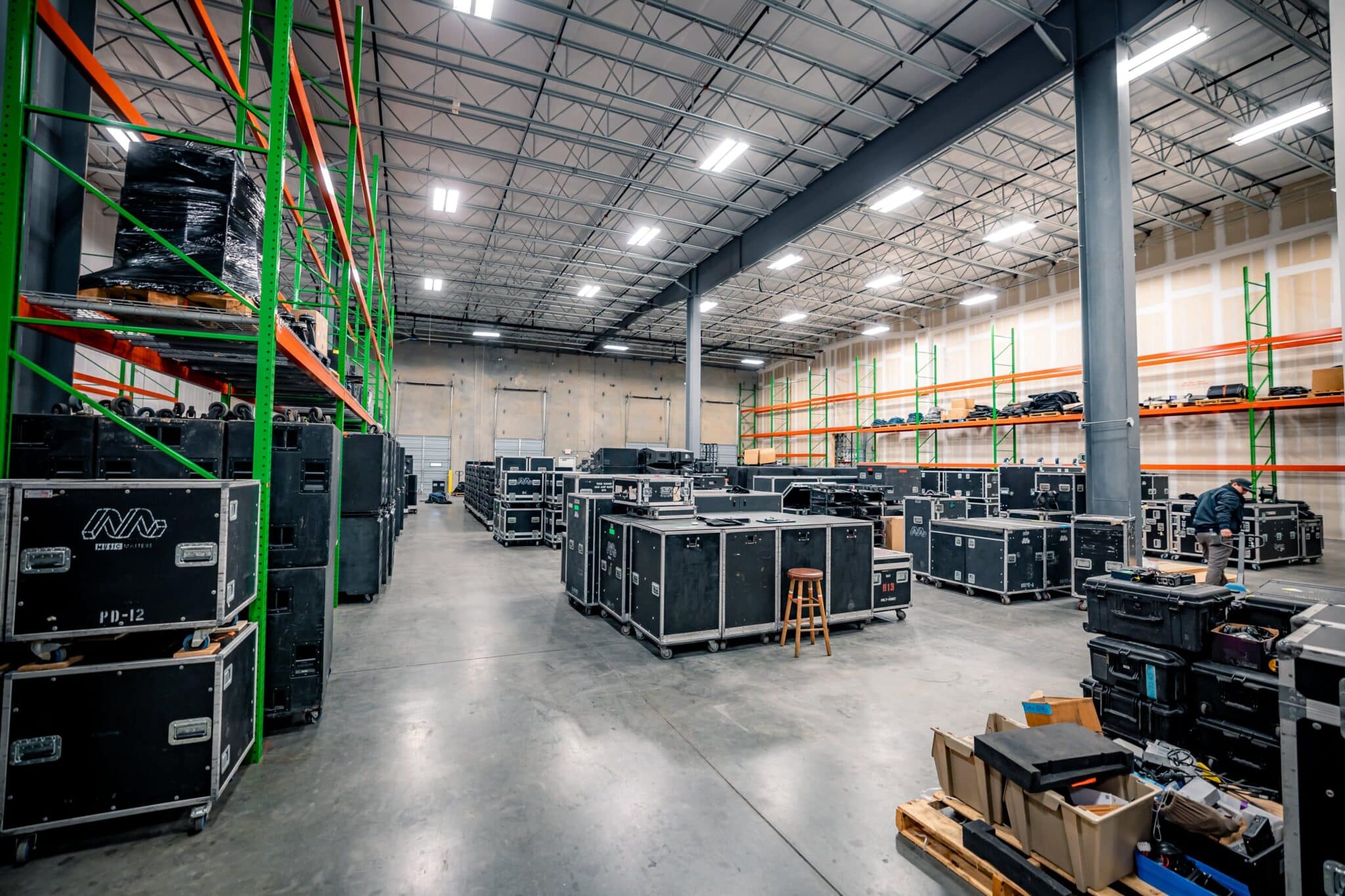
Company adds 20,000 square feet to meet growing demand
Music Matters Productions (MMP), a premier provider of audio, lighting, video, staging and rigging solutions, has expanded its metro Atlanta headquarters, increasing the total warehouse footprint from 40,000 to 60,000 square feet.
In addition, MMP has opened a second 10,000-square-foot building directly across the street to house its growing corporate production division.
The expansion comes in response to increased demand across touring, festival and corporate markets, as well as the continued growth of MMP’s high-end gear inventory. With a fully dedicated shop for each department, including audio, lighting, video, rigging and staging, the new layout provides more space for show prep, pre-rigging and crew coordination, allowing for even more efficient load-ins and streamlined execution.
New features
The rigging department now features a new mobile motor hoist test stand, allowing for in-house motor certification, a service that’s now available to external clients in the production community.
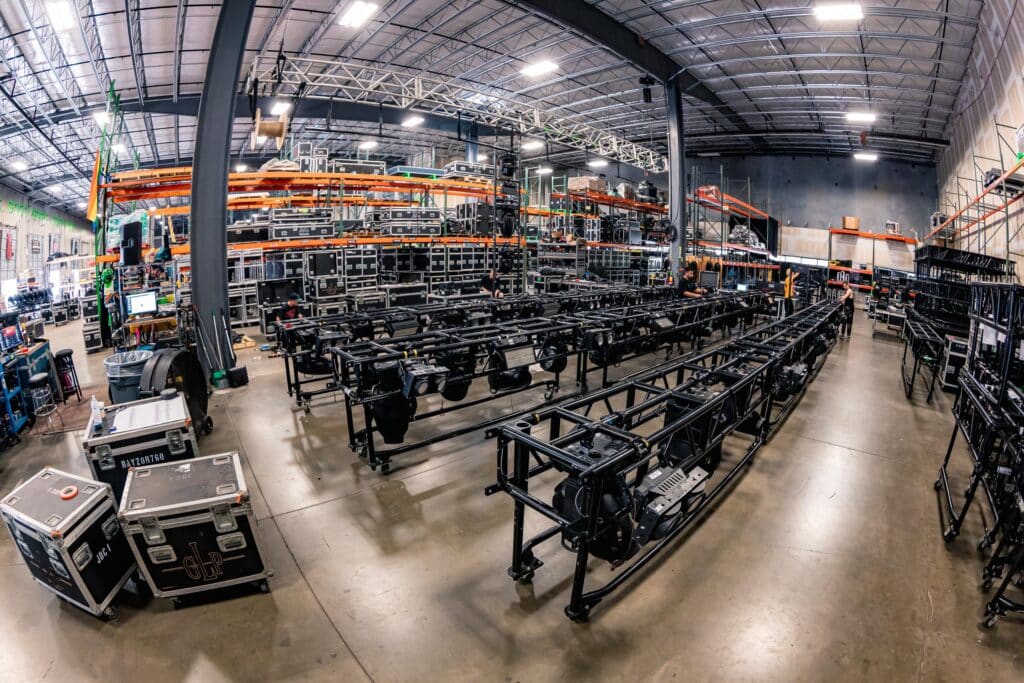
Five new truck bays were added in the process, as well, bringing the total number of bays to 17 — an important upgrade for MMP’s fleet and the increasing number of shows moving through the warehouse each week.
“This growth is a direct reflection of the work our team puts in and the trust our clients place in us,” said Aaron Soriero, owner of Music Matters Productions. “We didn’t expand for the sake of being bigger, we expanded because we needed the space to do the job right. More room means tighter prep, faster turns and better support for our clients.”
Expanding operations
The expanded warehouse and building across the street include additional offices, mixed-use areas and a dedicated repairs department, giving the team more capacity to prep, collaborate, QC and scale for increasingly complex events — both corporate and entertainment.
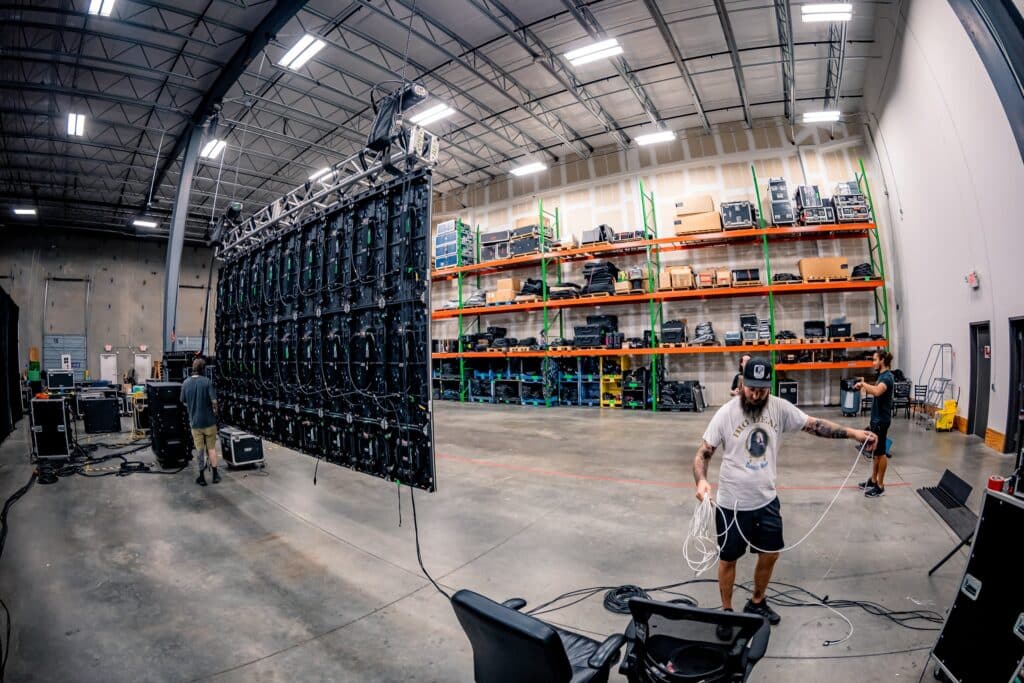
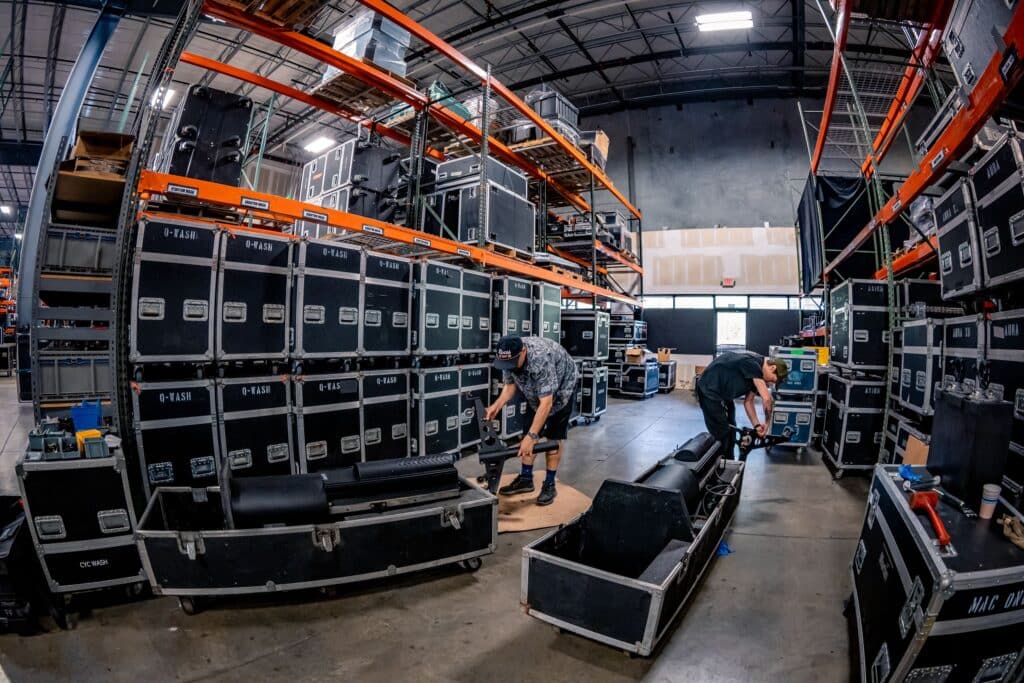
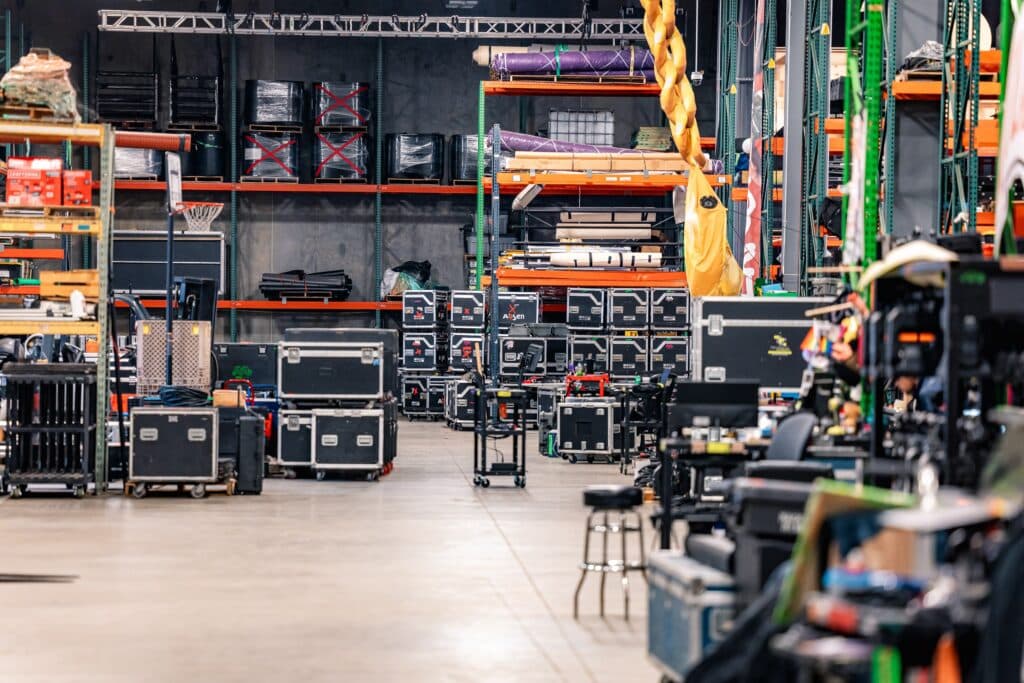
With a reputation built on reliable gear, experienced crews and an enhanced client experience, MMP continues to solidify its role as a go-to production partner for events of every size and setting — whether it’s a beachside festival, a stadium tour, brand activation or a high-stakes corporate show.
About Music Matters Productions
Music Matters Productions is a full-service live event production company based in Peachtree Corners, Georgia, providing industry-leading audio, lighting, video, rigging and staging solutions for tours, festivals, brand activations and corporate events across the country.
Known for its high-end inventory, seasoned crew and deep dedication to doing the job right, MMP supports hundreds of productions each year and is trusted by clients nationwide.
For more information, visit mmp-atl.com.
Related
Business
From Boardrooms to the Himalayas: Vandana’s Journey to Purpose and Growing with Intention [Podcast]
Published
2 weeks agoon
May 19, 2025
How one family blends operational clarity, conscious leadership, and community-driven values to grow their business — together.
In this episode of UrbanEbb, host Rico Figliolini chats with Vandana Aggarwal, VP of Operations at Aggarwal Real Estate, about the winding road from global consulting to family-run commercial real estate in Norcross, Georgia. With honesty, warmth and insight, V shares how she went from working 80-hour weeks in corporate strategy to rediscovering clarity in the mountains of India — ultimately helping transform her family’s business into a community-driven real estate firm managing over 50 shopping centers.
The conversation weaves together themes of leadership, legacy, operational excellence and the transformative power of both AI and yoga. It’s a story about clarity, courage and conscious growth — both in business and in life. This is another episode you won’t want to miss.
Episode Highlights
- Why Vandana left a high-powered consulting career to join her family business
- How hiking Kilimanjaro and studying yoga in the Himalayas changed her leadership mindset
- The operational overhaul she brought to Aggarwal Real Estate to support growth
- What it’s like working side-by-side with your dad, siblings, and 700+ tenants
- How the company rebranded with intention and built a mission around “building communities as a community”
- Where AI is reshaping real estate—from lease drafting to property management—and where it still can’t compete with people
- Leadership succession planning with siblings at the helm
- The importance of clarity, calm, and conscious growth in both business and life








About Vandana Aggarwal
Vandana Aggarwal is the Vice President of Operations at Aggarwal Real Estate, her family’s commercial real estate investment and management firm. She brings a unique blend of strategic insight and operational excellence, shaped by her early career as a consultant at A.T. Kearney, where she advised Fortune 100 to 500 companies. A graduate of Georgia Tech, she also took a transformative detour from the corporate world to spend a year in India teaching yoga—an experience that continues to influence her leadership style today. At the core of her work is a deep commitment to family and a passion for building strong, connected communities.
Timestamp:
00:00:00 – Introduction and sponsors: Vox Pop Uli & EV Remodeling
00:03:12 – From Georgia Tech to global consulting
00:04:23 – Leading strategy for Fortune 500 companies
00:06:11 – The role of vision alignment at the C-suite
00:08:01 – Sabbatical becomes family business overhaul
00:09:35 – Bringing operational excellence to a growing real estate firm
00:12:02 – A year of yoga, nature, and healing in India
00:17:03 – Hiking Kilimanjaro, testing limits, and expanding self-trust
00:18:52 – Navigating family dynamics inside a business
00:21:56 – Planning for leadership transition: siblings, strategy, succession
00:24:06 – Rebranding the business: from American Management to Aggarwal Real Estate
00:26:33 – Where AI fits (and doesn’t) in real estate operations
00:30:04 – Legal, leasing, HR, and marketing efficiency with tech
00:31:01 – Community-focused retail and experiential shopping centers
00:32:00 – Reflections on AI, journalism, and digital trust
00:32:57 – Closing thoughts
Podcast Transcript
00:00:00 – Rico Figliolini
Hi, everyone. This is Rico Figliolini, host of UrbanEbb. This podcast comes out of the city of Peachtree Corners, and we have a special guest today. And if I don’t mess up the name, it’s Vandana Aggarwal.
00:00:15 – Vandana Aggarwal
Absolutely. You can call me V, Rico.
00:00:15 – Rico Figliolini
I’m going to call you V, trust me. And I’m Rico Figliolini, so a bit of a long name there. But V is VP of Operations of Aggarwal Real Estate here, based in Peachtree Corners? No, Norcross.
00:00:30 – Vandana Aggarwal
In Norcross, yeah. Norcross, Georgia.
00:00:32 – Rico Figliolini
Yeah, yeah. Just off 85, and?
00:00:34 – Vandana Aggarwal
Jimmy Carter.
00:00:35 – Rico Figliolini
And Jimmy Carter.
00:00:36 – Vandana Aggarwal
We’re completing each other’s sentences already.
00:00:39 – Rico Figliolini
But where are we doing this? We’re doing this from one of our great sponsors, one of our two great sponsors, Vox Pop Uli. Was this tastefully obnoxious? Let me tell you, I asked them to do a corner cut for us, and this is perfect. So they have the Moxie logo and stuff. So they’re branding, right? Same way they can brand your stuff. They’ll put your logo on anything. They’ve done, I think, 6,000 vehicle wraps. They’ve done garments, obviously. They could do one-offs or they could do 1,000. They do trade show booths, wraps, everything. So anything you need a logo on, think of what object you want it on. They’ll figure it out for you. And if you’re doing, let’s say, 5,000 mailers and you want that database customized for each postcard, they could do that also. It’s called data. I forget what it’s called, but they can do that. They can work the data into the printing as well. So all customizable. Check them out, voxpopuli.com. Now, getting to something we were talking about, hands-on stuff, which is this also. This can’t just be done by machines, right? Although machines, you still need people. But EV Remodeling Inc., they are a remodeling company. They can do design to build. They can do whole house renovation. They can create your deck, your backyard gazebo. They can put a bathroom, kitchen, anything you want. EV Remodeling Inc. is owned by Eli and his family. Lives in Peachtree Corners. It’s based out of our city. They’ve done, I think, over 250 homes recently. So check them out, evremodelinginc.com. And I want to thank both of them for being great sponsors of ours. So, it’s always a long stretch doing that, but I’m glad to have you, V.
00:02:22 – Vandana Aggarwal
I’m happy to be here. Thank you for inviting me onto your podcast. Excited to chat with you.
00:02:25 – Rico Figliolini
Yeah, no, this is cool. Well, you know, I met you, where did I meet you at? I think it was the chamber.
00:02:30 – Vandana Aggarwal
Yeah, the Southwest Gwinnett Chamber event.
00:02:32 – Rico Figliolini
Yeah, and we were talking a bit, and I was like, damn, you know, I had my father owned a business, and he wanted his kids to be in it. None of us, none of us could go into that business. It’s a little difficult, different industry. It was a hard industry, plus my father was very patriarchal, very over-demanding. God bless him. He mellowed in age. But when you were telling me about your family, I mean, your father, your mother, your sister, your brother, and you, I mean, all in it. It’s amazing.
00:02:55 – Vandana Aggarwal
We’re all together. We’re the modern-day Brady Bunch.
00:03:03 – Rico Figliolini
I love it. Yes, that’s exactly it. But, let’s start a little bit. I mean, you were telling me, I mean, you came from a consulting world. You came where you were actually being paid a lot more than you’re being paid right now, actually.
00:03:12 – Vandana Aggarwal
I told my father he couldn’t afford me when he recruited me out. So I graduated from Georgia Tech in 2007. I actually did join his company right out of college for two years, learned a lot about the company. He actually had me go through a rotation in every department of the company to learn more about what we did, how we operated. And I think very quickly, it was also 2008-9 with a recession. But I was also very interested to learn how big companies operate. How can you take a small company at that time? We were much smaller than we are today and really understand how do you go from this, which is where everyone starts, right? As a new company to get to be one of the largest in the nation, in the world and see how they operate, how they grew it from, you know, a mom and pop business to this global enterprise. Consulting was a natural transition to learn about multiple companies, multiple industries. So transitioned into AT Kearney, which has now been rebranded as Kearney, and out of their Chicago office. So I was there for seven to eight years, almost eight years.
00:04:23 – Rico Figliolini
Entry-level position you got in?
00:04:24 – Vandana Aggarwal
Yeah, I went in as an analyst. The good thing with that experience was by the time I left, I was a senior manager with Kearney. I worked across 17 different companies in those eight years. So I got to experience how CPG companies, retail companies, transportation, IT, you name it, I’ve done it. In terms of the different types of industries I got to work with, worked with a lot of Fortune 100 to 500 companies at the C-suite level. So we were coming up with all kinds of strategy projects such as new market entries, mergers and acquisitions. A lot of what I ended up specializing in in those seven years was operational efficiency and growth strategy. So it was an amazing, I’m grateful for that learning experience, the you know the caliber of minds that you work with. You also get to experience what the C-suite looks like. How does the very top operate and then it goes from the top down right? So it is very much led at this very top leadership and you see how companies change in their culture the way they operate based on how the top is designed.
00:05:38 – Rico Figliolini
So did you see good and bad at the top?
00:05:41 – Vandana Aggarwal
Absolutely. And I’m not going to name names. But you learn a lot when you see how your CEO and your C-suite right below them, the culture they’re bringing into a company and their vision and their goals if they’re aligned, unaligned. Anyone that at the very top have different viewpoints of where the company has had it is where companies start to break apart, lose revenue, lose their you know people, which is very important.
00:06:11 – Rico Figliolini
Where did you see the pain point then? What was the common denominator I guess of those?
00:06:18 – Vandana Aggarwal
There’s no one common denominator, but if I had to kind of narrow in, it comes down to what is our five-year, ten-year trajectory? Where are we headed? As large companies grow, you’re not just in one industry. You’re not just doing retail shopping centers. You’re investing in all kinds of properties just to bring it back to our company. Similarly, a CPG company can make all kinds of products, so they have to decide what it is because you have to be concentrated on the right places. If you have a leadership team that is in alignment of what that ultimate goal is, right, then you have clear strategies and, you know, metrics you’re measuring your success against. So that was a big thing that I learned. Also just, you know, seeing how great leaders operate, right? Some of the best in the nation today, I got to be in the room with them and just to see how they lead is very important.
00:07:14 – Rico Figliolini
Did you see any family dynamics in any of those businesses?
00:07:20 – Vandana Aggarwal
No. You know, there may have been like a father-son duo, but when you’re looking at the very top, I won’t say it was like all in the family, right? You know, and it also becomes the size of a company, right? You know, when you get to an international scale, you’re not always blessed that every person in your family has the right skill set and experience to fill each role on that C-suite.
00:07:46 – Rico Figliolini
I’m just thinking Trump for some reason. Every kid has a job.
00:07:51 – Vandana Aggarwal
Every kid has a job.
00:07:52 – Vandana Aggarwal
You had the accent, right?
00:07:54 – Rico Figliolini
Pretty much, I guess. So after the C-suite or expansion, you traveled a lot too, I think, right?
00:08:01 – Vandana Aggarwal
I did, yeah. So after my seven, eight years in consulting, I was reaching 30. And Shiv, my father, came to me and he said, you know, you’re doing this for a lot of outside companies. Why don’t you help us grow and bring your expertise home? And I said, look, I’ll take a sabbatical. Let me assess the company. And after that period where I took a short sabbatical to come look at how we were operating, I said, I can give you three years. I said, you can’t afford me, but I’ll give you three years of my time. And I said, I think it’ll be the right, it was the right time in the company. We were investing very heavily. We were bringing in a lot of new square footage into the company, and we weren’t designed to manage it. So we as a company, as you know, we are the investors. We have an in-house management company, an in-house leasing company. So as we acquire new properties, our team does the management for those properties in-house. We don’t provide third-party services today. And we do the leasing in-house. But at that time, when he, you know Shiv started we had one or two and now we’re at 50 shopping centers plus and other investments that we have. And there’s a very different way you operate you know and how do you how does the CEO go from being an operator to where he’s overseeing it, but he’s not into the weeds right? So he has create a system for that to happen right? You have to have standard operating processes for your property managers, your accounting team, your marketing team.
00:09:35 – Rico Figliolini
And you quite didn’t have that before.
00:09:37 – Vandana Aggarwal
We didn’t, no. And, you know, and I think that’s why he wanted to bring me in is because my strength is operations and I love it. I love going into messy places and cleaning them up.
00:09:49 – Rico Figliolini
Is that what you did when you were a consultant?
00:09:51 – Vandana Aggarwal
A lot of what I was concentrating on at the end of my consulting career, yes. So I did a lot of operational efficiency work. So we’d go in, assess the way companies were designed. And we’d interview hundreds of team members to understand what their role is. You know, what are they responsible for? How are they delivering? What are they measuring for success? And then we’d redesign the way they did that based on, again, bottom line, what are your ultimate goals for the company?
00:10:21 – Rico Figliolini
So you had to understand that before you got to that point. And you’re not making the decisions, the C-level.
00:10:29 – Vandana Aggarwal
Present, right? And similarly even with Shiv, when I first joined, I said, look, this is how I think we need to redesign the company from a bottoms-up perspective based on ultimately our goal of growth, doubling, tripling in size over the next ten years. And I think this is where the father dynamic came in. I guess he trusted me. And he said, do it. He just said, do it. And it was beautiful because right when you’re with large companies, it’s a lot of time before you get. Those decisions made and that trust, right? And so it was great. And he said, yeah, just put it into place.
00:11:07 – Rico Figliolini
See, that’s a great dad, actually. Some dads would be like, I don’t know about that daughter or son or whatever.
00:11:16 – Vandana Aggarwal
It did take time, though, like to ultimately, he was in the operation so heavily. And, you know, until today, I’m still like, step up, step up. Like, I need you to not get into the weeds. Like I think at that time we had tenants calling him, maintenance guys calling him. Like every little and big problem would go through his cell phone. I said, you’re too smart and you’re such a good investor. This is not your skill set. You shouldn’t be managing this. You need to bring people on who are expertise in this area. And I said, you need to be focused on like the larger plan.
00:11:51 – Rico Figliolini
This way you can grow it better.
00:11:51 – Vandana Aggarwal
Which I think has been very successful over the last eight years I’ve been with him now.
00:11:57 – Rico Figliolini
So before you got to him, though, you were traveling a bit internationally as well?
00:12:02 – Vandana Aggarwal
Yeah, yeah. So this is an amazing year. I was very burnt out. By the time I left consulting, I was working 70 to 80-hour weeks, traveling Monday through Thursday, if not more than that, of the week. So I told Shiv, I was like, I’m going to take a month. I’m going to go to India, get my yoga certification. No intention to teach at the time. I just said it’d be a great one-month retreat. And I was up in the mountains like Himalayas and India in a city called Dharamshala. Beautiful place. One of my favorites in the world. And I just, I think I needed it for myself emotionally, mentally to take that break. So I turned one month into one year. I didn’t know it was going to be a year.
00:12:49 – Rico Figliolini
In that same city? In that same town?
00:12:50 – Vandana Aggarwal
Yeah, so I ended up the school that I had gotten my certification with. I asked them, I was like, do you mind if I hang around for a little while? Like very casually, I’m like, you know, I’ll pay for my room and board, but I just want to be around this group and this energy. And they said, well, if you’re going to be here, why don’t you intern? And they’re like, room and board is free if you intern. I was like, sure. You know, not thinking what it was leading to. This is like that beauty of the universe coming into play. Yeah, so I started teaching, ended up loving teaching. So then I ended up teaching the 200-hour yoga training course. And I was in Dharamshala for four months. And then I moved down to Goa, their Goa campus for another six.
00:13:30 – Rico Figliolini
Where is that? Goa?
00:13:32 – Vandana Aggarwal
Goa? It’s in southern India on their west coast. It’s a beach town. Yeah. So I had the mountains and the beach. But I’m a mountain girl. I’m a hiker. But no, it was a beautiful experience. Very different from anything I’ve done with my career, right? But I became a yoga teacher for a year.
00:13:52 – Rico Figliolini
Did that clear your head? Yoga, they say, can do that, right?
00:13:53 – Vandana Aggarwal
Yeah, it’s all the tools of yoga, right? The meditation, the breath work, really getting internal, going in, right? Just going inwards, being quiet, which we don’t have. We have a lot of noise in our life today, you know? And naturally, right? Between family life, work life, social, and then just all of the noise from everything else right? Like we’re sitting here and I can hear the cars right? So you know that difference was when I was sitting there, I could hear the ocean waves and so there’s something very healing in nature naturally. So it was the tools mixed with nature and I still think nature has a very strong healing power on us. So whenever I can, I try to get out on a mountain and by the ocean. But yeah no it was it was a beautiful experience but it did bring a level of calmness into the way I approach things. It changes your perspective of you know at the end everything’s okay. No matter what you’re going through it’s temporary you’re, and everything that’s happening to us is happening to us for the good. We don’t know it, sometimes it seems like a bad situation in the moment, but ultimately you know, universe, God, whatever you believe in is at play to bring you something better in your life. And you just have to step back to understand what is it delivering us.
00:15:19 – Rico Figliolini
I like the way you think. My wife every once in a while would say, aren’t you upset about that? I’m like, I think come tomorrow, it won’t mean anything. There’s no point in, just relax. Not everything, two days later, it’s not as important as it seemed at that moment.
00:15:37 – Vandana Aggarwal
Yeah. And it’s not just that it’s not as important. It’s also like…
00:15:41 – Rico Figliolini
In perspective?
00:15:42 – Vandana Aggarwal
It’s, what am I gaining from this? Like, what can I gain from this? Oftentimes when, you know, a lot of things happen, yeah, like you get hurt or, you know, it’s like in relationships, right? Or if you have a bad business deal, right? It’s like, hey, how am I growing, right? And I think that’s what makes life very exciting, right? Otherwise, if you’re always living on a high, is it a high?
00:16:06 – Rico Figliolini
Yes. So I’m thinking you were a consultant for seven or eight years. 80 hours a week. And all of a sudden you’re doing yoga on the mountains of India. It’s just like, it’s almost like a movie. It’s almost like…
00:16:18 – Vandana Aggarwal
Eat, pray, love?
00:16:19 – Rico Figliolini
Yes.
00:16:20 – Vandana Aggarwal
It was my eat, pray, love moment for a year.
00:16:23 – Rico Figliolini
That’s amazing.
00:16:24 – Vandana Aggarwal
No, you meet amazing people, but I think we were meant to meet everyone that we come in interaction with on a daily basis. You naturally have a connection. There’s a universe at play, and we were meant to cross paths and learn something from each other, gain something from one another, give to the other person. And I think you just have to look at life that way.
00:16:48 – Rico Figliolini
I definitely think along that way. I mean, I definitely think each of us nudges each other in a crowd a little bit. That one nudge can set you off going in a different direction. So I totally believe in that. So you joined your dad. Yes. And you’re, so actually, even before we get there, so yoga, but what other interests have you been?
00:17:03 – Vandana Aggarwal
Yeah. So, I mean, I’m an avid hiker. I’ve done recently in the last few years, I’ve climbed Kilimanjaro. I did the Machu Picchu trail. I’ve done a few 14ers out in Colorado, but I like to test myself physically. You know, just, again, it comes down to how do we find that push within us past our comfort zone? So is this a physical inability or is it a mental constraint? So to get past that mental constraint of discomfort and then really push yourself to the next level and say, I can achieve something. It’s not going to be easy. So to me, if I’m on a hike and it’s not hard, I’m like, well, was it a hike? Like it didn’t test me, but no I think, you know.
00:17:55 – Rico Figliolini
You should do the Appalachian Trail. That’s like 2000 plus miles.
00:18:03 – Vandana Aggarwal
I know. And it is, you know, it’s not just like the hiking part. It is like living out in nature and, you know, sleeping in uncomfortable conditions. Yeah. Walking in the rain. It’s cold. I think the last day of our Kilimanjaro hike, it was negative 20 degrees up in the mountain and my eyelashes were frozen and I couldn’t feel any part of my body. And, you know, and it tested my breathing. And there is that element of push yourself to the point that it’s not your ego anymore. Like if your body’s saying stop, you have to stop as well and respect your body. But yeah, to really test yourself.
00:18:38 – Rico Figliolini
To circle all that back now, you’re back home. You’re working with your father and your family. A lot of businesses grow or die because of family. If it’s a family business, right?
00:18:52 – Vandana Aggarwal
Absolutely, yeah.
00:18:53 – Rico Figliolini
So you have your highs, your lows, your, sometimes you don’t get along. Sometimes decisions are split. People get upset with each other. So you’ve been at your highs and lows physically and mentally doing other things. Has that helped you in some ways? Not that you’re having a bad time with family. Because it sounds like you all fit just fine, like the Brady Bunch.
00:19:15 – Vandana Aggarwal
Let’s keep it that way. No, I mean, there’s multiple dynamics at play. It is a family business. My father is also my boss. My siblings are also my friends and my coworkers. And it’s about no matter how hard you try, you cannot separate those relationships. There is an interplay of all of it when you spend eight to nine hours a day together. But we all have, again, a common goal for the company. And then a common goal for our personal relationship. So when we sit down, we keep in mind that we like each other and we want to keep it that way. Like very simply put, that’s first and foremost for me especially. Even when Shiv had brought me in, he said, oh, can you manage everyone? And I said, I’ll manage everyone but my brother and sister. I said, you know, like I won’t jeopardize the relationship I have with them as a sibling by being their manager. Especially because I said that’s your job like good luck. But not just that it’s you know we all have different skill sets so I said how do I manage my brother who is a genius he’s a CPA by trade you know like I can’t tell him how to run the financials of this company like he’s supposed to teach me that right? And same way I teach him that. My sister has a master’s in marketing right? She is by far the most social, likable person you’re going to meet, and she knows how to work with people. I said, she needs to teach us that. So I think we’re lucky that each of us, and this is, I think, rare, where you have three kids and each one of them has their own skill set. That, I think, helps us stay in business and we see ourselves foreseeably into the long-term future being in business together is because we each bring something very unique to the table. Ultimately we value the relationships that we have on a personal level as a family above all else right? And then you know the element of like, how does the yoga experience a hiking experience teach us. That’s, it’s not specific to anyone’s situation, I think it’s a baseline of who you become right? The foundation. Like it teaches you patience, it teaches you again, everything is temporary so let’s not get overly attached emotionally or get upset or too joyful, even like, let’s just stay neutralized on any situation because it will end. And then the next one will come up and kind of flow with the ebbs and flows of the ocean. You, you flow with everything that comes with you, comes your way at work, at home. But yeah, I mean, we do sit down as a leadership team. I, my father and my siblings and I, and we talk about, hey, we separately do the exercise. Where are we going to be in five years? What role do we play in that journey? And thankfully, all of ours are very similar in what our goals are. And then we have different skill sets that we bring. So even as we design the future of the company in a moment where my father is not at the head of the table, we’re working on that redesign work. But it’s very conscious. It’s very intentional. Again, we all step back and say, hey, look, how do we maintain, how do we solve problems? Because like, you know, we were talking about how tomorrow we may not agree on something, a big decision. What are we investing in? Come back to, you know, right now Shiv gets to make an ultimate decision because he’s the one leader at the top. Tomorrow it’s going to be three people at the top. How do you deal?
00:23:04 – Rico Figliolini
So is there an exit plan for your dad? Well, not an exit plan.
00:23:09 – Vandana Aggarwal
Not an exit plan. He already has. I think he, you know, he’s gone from, he’s the hardest working person I know. I get that from him. We’re addicted to work.
00:23:18 – Rico Figliolini
80 hours a week.
00:23:21 – Vandana Aggarwal
We love working. You know, this company is his baby. I think I’ve adopted it at this point and we all have. But, to stay mentally sharp, to stay alive, you have to keep working. You have to keep doing something. You have to be working towards something that brings you joy and purpose. And I think, you know, he stepped back to take time towards a lot of his nonprofit work, community work that he’s very much engaged with. But he’s still at the top. He’s still running, you know, his, you know, he’s, you know, not slowing down. You know, we’re constantly growing. We’re growing this year in a large scale, which is amazing, and he’s leading that charge.
00:23:59 – Rico Figliolini
How many properties do you own?
00:24:02 – Vandana Aggarwall
Today we have 50 shopping centers and then a few other assets.
00:24:06 – Rico Figliolini
Is that like 3 million square feet or something? 4 million?
00:24:10 – Vandana Aggarwal
Yeah, over 700 tenants. But, you know, when we sat down a few years ago, we rebranded. Aggarwal Real Estate didn’t exist until two years ago. It was American Management Services. And we had a rebranding effort because we said we want the company’s name and the brand to represent who we are.
00:24:33 – Rico Figliolini
I like that, by the way.
00:24:35 – Vandana Aggarwal
Yeah, it needs to mean something. And we were also proud of what our father has achieved, right? He’s given us this beautiful life that we get to help grow upon. So we said it needs to pay homage to him. So we said, let’s make it Aggarwal Real Estate, ARE. And then as we were deciding what that vision is, we’re a family. In the company, we are a family, not just the four of us, but all of our staff, our team. We don’t, you know, we don’t look at them separate from who we are. And so we said our mission as a company is building communities as a community. And it talks about, hey, in all of the real estate work we’re doing, we try to make sure all of our properties are beautiful. Our tenants are happy. They have direct access to each of us in the company. And on top of that, as a company, we are a community within ourselves because we can’t create them until we are one. So it was very intentional to who we already were, but putting it into brand terms.
00:25:37 – Rico Figliolini
It’s amazing. All that property, tenants. Can’t imagine father tech can send text messages on all their problems, if they have any.
00:25:45 – Vandana Aggarwal
He’s a brilliant man.
00:25:45 – Rico Figliolini
You could be too possessed on that stuff. We want to be cognizant of our time together.
00:25:55 – Vandana Aggarwal
Absolutely.
00:25:57 – Rico Figliolini
So the next subject really was going to be about also AI, because everyone’s talking about AI. We were talking about that before the show started, before we started recording, which was kind of funny because V was asking me if we edit anything. And I was like, no, straight through.
00:26:11 – Vandana Aggarwal
I wanted to see if I could say a few things and then have it taken out of this conversation.
00:26:13 – Rico Figliolini
Nope. Nope. Doesn’t work that way. So, but ChatGPT, AI, that’s all. I mean, you know, could I create a bot to edit this? Probably. But there’s so many things we use in our lives. And you’ve been talking about how it would affect your business. Nevermind the consulting work you did.
00:26:33 – Vandana Aggarwal
Yeah. I mean, the consulting world is, I mean, it depends on the industry, the type of work you’re doing. In real estate, I’ve put a lot of thought behind this. There’s a lot of conversations happening across every industry, every sector, whether it’s education, automotives, real estate, et cetera. Everything’s being discussed. How is that changing the future? How do we incorporate it to be more efficient, right? Be the best in the industry that we can be or operate better. And so for me it’s again comes down to that operations element that I think about like, how do I incorporate it for a company that’s a medium-sized real estate firm today as we become a large company, a bigger player in the market. And people are very important in real estate right?
00:27:17 – Rico Figliolini
Talk about editing?
00:27:20 – Vandana Aggarwal
I was telling you, we should bring them into the podcast.
00:27:27 – Rico Figliolini
We’re going to run a little longer on this.
00:27:36 – Vandana Aggarwal
But let’s take retail shopping centers. This is brick and mortar. I did a paper actually for a large mall retailer back in my consulting days on how the title of the paper was, is brick and mortar dead? And, you know, full circle, I am fully dedicated to brick and mortar, retail, office, multifamily now. But you still need people to clean up your properties, fix your maintenance issues. We were talking about roofing, plumbing, electrical. That is hands-on work. You know, today there is, it’s going to be a long time before there’s a robot that comes in to do that. There will be. I don’t know. I do not see that in 10 years to say we’ve got roofers that are robotic drones that are going to come fix my roof problems.
00:28:24 – Rico Figliolini
Zumbas, they’re going to run around the roof or something.
00:28:26 – Vandana Aggarwal
That’s actually genius. A Zumba for my roof.
00:28:31 – Rico Figliolini
Why not? Attach it to the right thing.
00:28:33 – Vandana Aggarwal
But so those are very people-oriented roles today. Technology will advance how quickly it’s done or how well it’s done. But you’ll still need someone to operate the machinery of it and everything.
00:28:49 – Rico Figliolini
Just not as many.
00:28:50 – Vandana Aggarwal
Yeah. Construction, similarly, right?
00:28:54 – Rico Figliolini
Unless you 3D print a house. I’m sorry.
00:28:56 – Vandana Aggarwal
No, it’s true. It’s true. There’s so many options. I’m thinking 10 years now. I’m not going to have a 3D printer making the metal framing for my new construction project. You know, or installing the sheetrock, it does probably speed up the process, right? There will be machinery to help with that, a lot of AI development in that way. It’s a lot at an office administrative level, right? The speed in which you’re processing invoices, the speed in which you are, you know, getting payments taken in. Today, I would say as far back as right before COVID, we were still accepting checks for money. Now it’s all online. Like we do not accept money coming into the office, or it’s very limited to what we do, right? So that’s AI, if you think about it, right? The ability to pay online.
00:29:42 – Rico Figliolini
QuickBooks Online uses AI now, you can enable it.
00:29:47 – Vandana Aggarwal
So we’ve been using it for many years. The advancement of it has been a little bit slower, and now it’s sped up. Marketing, we were just talking about how you created a flyer on ChatGPT, was it?
00:30:00 – Rico Figliolini
I won’t talk about the student that’s helping us out here and how they use AI.
00:30:04 – Vandana Aggarwal
No, AI in school, right? But yeah, it’s an AI processor for my HR roles, right? Instead of reading 100 resumes, it’s going through the system to filter them out. Whether it’s writing contracts, I won’t lie. Legal jargon is coming out of ChatGPT today. And so it’s speeding up the way we’re doing work. But my legal team probably, and they won’t say it, should be using AI if they’re not. To help create some of this work right? So it’s like these companies are still going to be needed, but the way that they’re able to respond to us at a quicker, everything would just happen faster right? From typewriters to computers, everything.
00:30:49 – Rico Figliolini
Especially if they know that they just did a lease from you for this property in Texas, that we need three more leases done for three other places, it’s not going to be that much different, right? It’s a template.
00:31:01 – Vandana Aggarwal
It’s coming out a lot faster. Yeah, I mean the negotiations, that’s a people-to-people thing right? So I think thankfully in the real estate world we’re still going to need people. We’re still going to need buildings right? The way built, we were just talking about how a retail shopping center is no longer just for shopping. It has to be for entertainment. It has to be for bringing families in and giving them more than just, hey, go into a TJ Maxx and buy something, right? It’s like, what else are you getting when you’re at that center? Whether it’s a play space or events, we’re starting to do more events at our shopping centers. So it’s, again, serving the community.
00:31:39 – Rico Figliolini
We’re seeing that more. More of that happening. We could go on and on here.
00:31:46 – Vandana Aggarwal
Chatting with you.
00:31:46 – Rico Figliolini
Yeah, and we should probably do one on either AI in the marketplace. Or maybe a panel discussion on something similar.
00:31:51 – Vandana Aggarwal
Yeah, overall, yeah. That would be exciting.
00:31:55 – Rico Figliolini
Yeah, I think that would be cool.
00:31:56 – Vandana Aggarwal
I think it’s interesting to learn about kind of where every industry is heading. It impacts all of us.
00:32:00 – Rico Figliolini
For sure. I mean, the magazine business, I mean, it’s all like we have certain, we have AI rules. But, you know, AI is still being used to degree to research things. And to do certain things like that. You know, hopefully journalism isn’t just handed over. They do say 40% of the internet is AI written. So, which is kind of incestuous almost because it’ll just feed on itself at some point.
00:32:27 – Vandana Aggarwal
There’s a whole discussion about the validity and the trust behind digital content. In the next few years. I think it’s going to diminish.
00:32:35 – Rico Figliolini
Oh, yeah. I mean, I’m seeing videos now and it’s just like, it just looks so real. And you could not tell the difference, even voice-wise.
00:32:42 – Vandana Aggarwal
And that’s scary to think. It’s like, how do you trust what you see?
00:32:47 – Rico Figliolini
So on that note, and since this is not edited, so this is right from the beginning. So this is all true. But I want to thank everyone. I want to thank you, V, for being with me.
00:32:57 – Vandana Aggarwal
Thank you so much for having me. This was a great conversation.
00:33:01 – Rico Figliolini
It went by way faster than some of these go. So this is a great discussion. Thank you, everyone. I appreciate you for joining us. Thank you for Vox Pop Uli for the studio look and for letting us do it here, for being a sponsor and for EV Remodeling. Also, I want to thank Jeremy Pruitt behind the camera who has taken care. He’s a Paul Duke student. And it wasn’t him that I was talking about before, by the way. But all the work he’s done on the back end on this. So thank you, Jeremy. So thank you all. Thanks for being with us.
Related
Business
Peachtree Corners Grows Business Opportunities Through Economic Development
Published
4 weeks agoon
May 6, 2025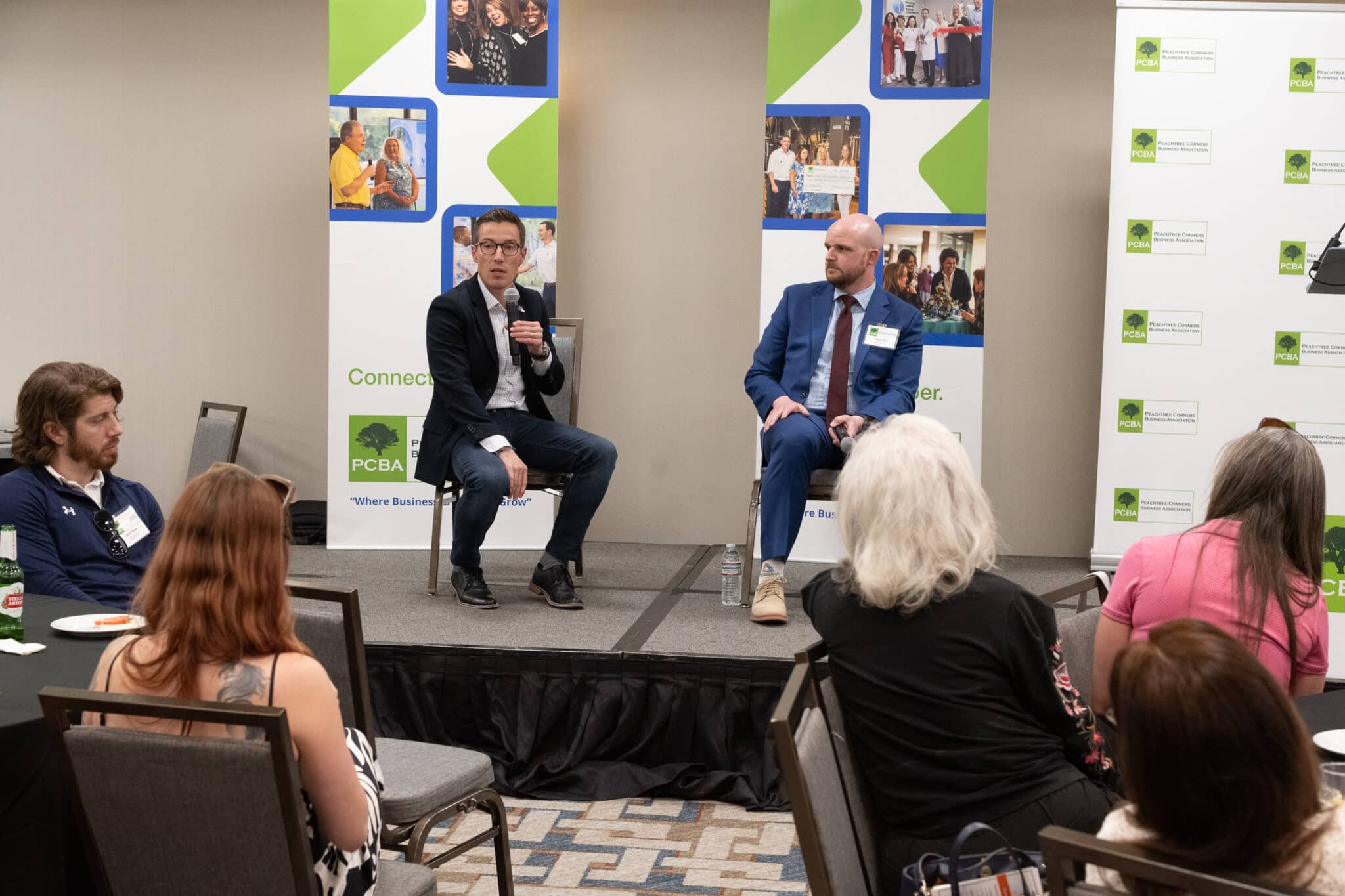
Most residents and business owners in Peachtree Corners probably think they know all about the economic development and strategic planning of Peachtree Corners, but do they really?
Peachtree Corners Business Association invited Peachtree Corners Economic Development Director Betrand Lapoire and Partnership Gwinnett Director of Economic Development Andrew Hickey to its After Hours Speaker Series on March 27 to discuss the city’s growth from a 1971 master plan to a bustling city with 42,000 inhabitants and 40,000 jobs.
Key points included the importance of business retention and expansion, with 24 projects last year creating 1,600 retained jobs, 1,600 new jobs and $250 million in new capital investment.
The Curiosity Lab, a world-class innovation center, was emphasized as a significant attraction. The city’s zoning and infrastructure plans were also discussed, focusing on balancing office and residential development to maintain a vibrant, sustainable community.
Matching jobs to residents
Although Peachtree Corners is just a teenager in terms of being an incorporated city, the foundation for this vibrant, fast-paced economic hub was laid more than 50 years ago by technology pioneer Paul Duke.
“Peachtree Corners was the first master-planned, business innovation technology park in metro Atlanta,” said Lapoire. “It was in response to the brain drain of technology with Georgia Tech graduates leaving the area.”
While the city may have a small-town feel, it’s the largest in Gwinnett County by population, but not land mass, he added.
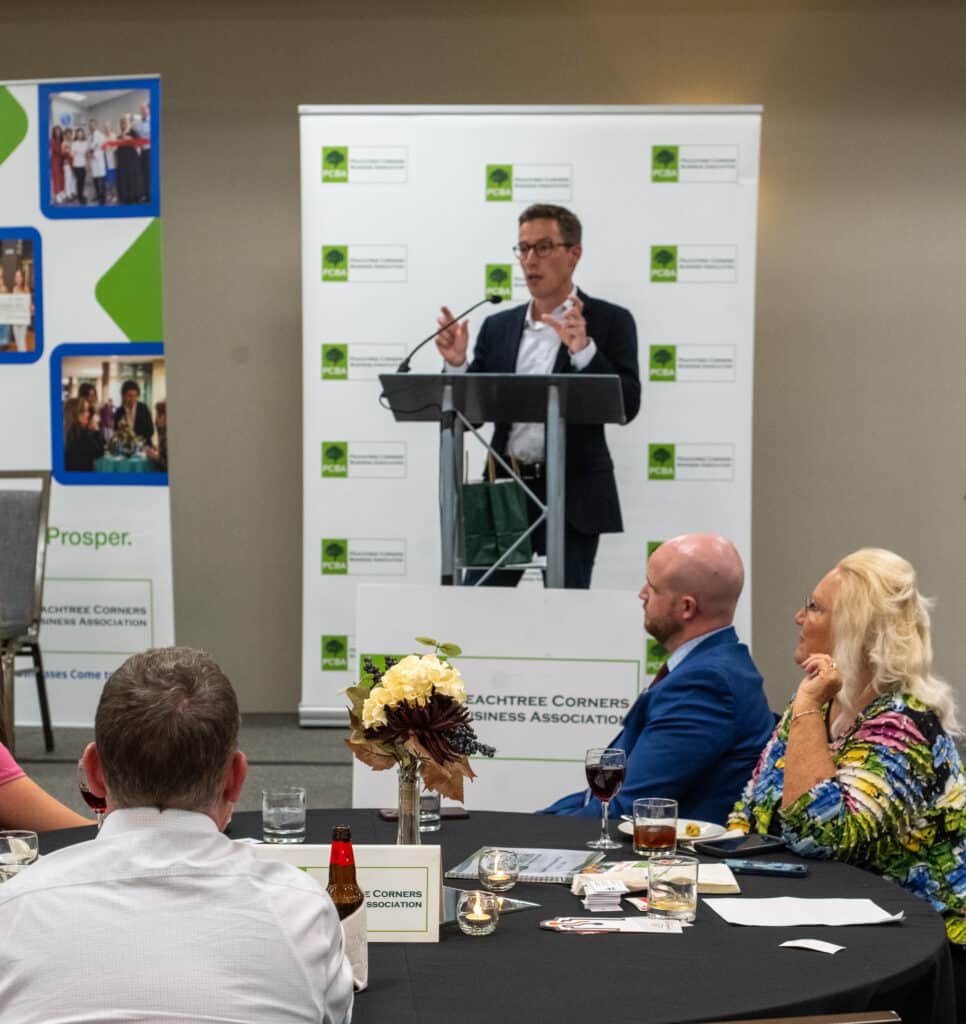
“The city started from a commercial, industrial, R&D base and then was expanded around it,” said Lapoire.
Though home to more than 42,000 residents, most of the jobs in Peachtree Corners are filled by people who live outside the city, he added.
“So we have this interesting mismatch, in a way, although not unusual,” said LaPoire. That creates traffic and transit issues. So that means that one of the solutions is to create more jobs here to fit the profile of the community.”
He presented charts that show professional services, consulting and engineering as the largest job categories. The next tier of businesses are wholesale and manufacturing.
“So we have a good mix of industry,” he said.
A five-year plan
The city has a five-year economic development plan (2023-2028) that outlines strategies for attracting and retaining businesses, with education and workforce development being key components.
Partnership Gwinnett has similar goals as Peachtree Corners, but on a larger scale.
“We are the county’s sales and marketing arm for all 17 cities now, and we receive funding from both municipal sources as well as existing businesses here — both in Gwinnett and outside of Gwinnett as well,” said Hickey.
He shared how Partnership Gwinnett is designed to drive a lot of major corporations toward doing business inside and with Gwinnett County.
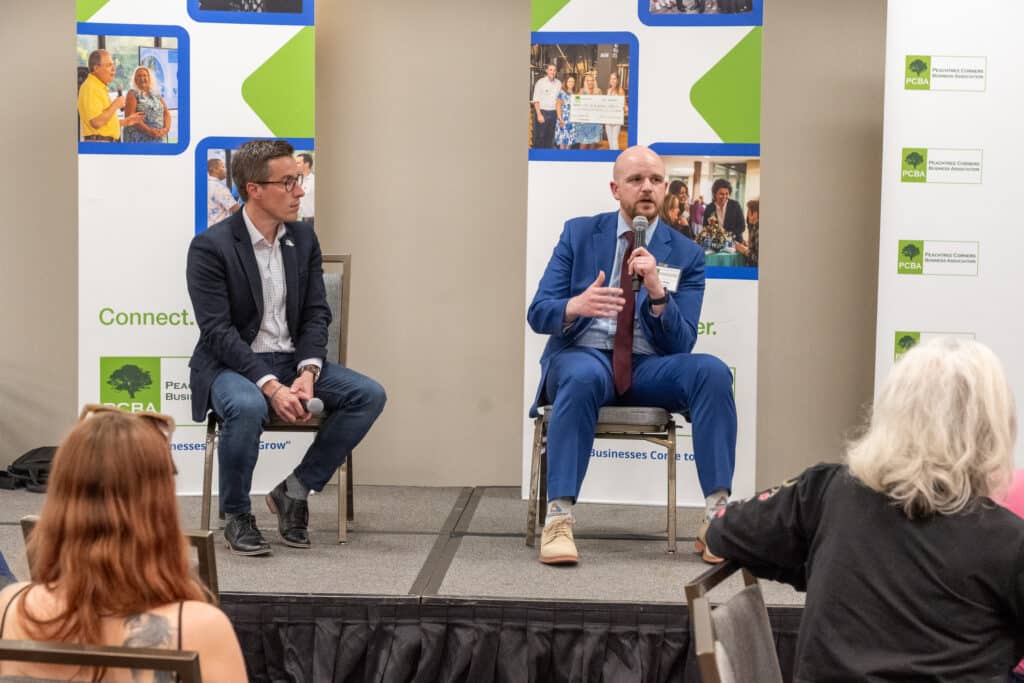
“One of the biggest things that we talk about that I’m sure it seems like most of us here, if you live here, you work here, you understand it. It’s the diversity that exists here in Gwinnett,” he said. “With a diversity index of 85, that means if we walk out of the Hilton here and we say hello to somebody, there’s an 85% chance they’re from a different ethnic or cultural background than ourselves, which to you and I may seem normal because that’s the life that we live in.”
He added that for companies, there’s a tremendous value in that, whether they have stated values, or they’re just making hiring decisions to get a wide range of candidates to fill those roles. Additionally, because of the proximity to Atlanta, Gwinnett County has a great labor draw.
Partnership Gwinnett
Partnership Gwinnett plays a significant role in recruiting businesses, expanding existing companies and developing the workforce. Hickey showed how the organization was involved with more than 24 projects last year.
“A majority of those were expansions, and that is a common thread you’ll see in economic development,” he said. “In business retention, expansion is so vital to working with our existing companies to make sure that they have the resources they need.”
He added that’s what leads to new investment and job creation in the community.
The organization also focuses on redevelopment projects, working with cities and the county to improve infrastructure and community amenities — especially strong educational institutions such Georgia Gwinnett College, Philadelphia College of Osteopathic Medicine and others.
Quality of life
In closing, both men stressed the importance of recruiting companies and developing the workforce, along with one aspect that means a lot but may not be as obvious — quality of life.
“It’s definitely evident that people like to work where they live — the whole live, work play experience,” said Hickey. “I joke that the part that people really have the most questions about, and are most excited to learn about, is new events at The Forum or Gwinnett Place Mall.”
Although they want to know what’s the next major company coming to Gwinnett, people REALLY want to know about how to spend their leisure time.
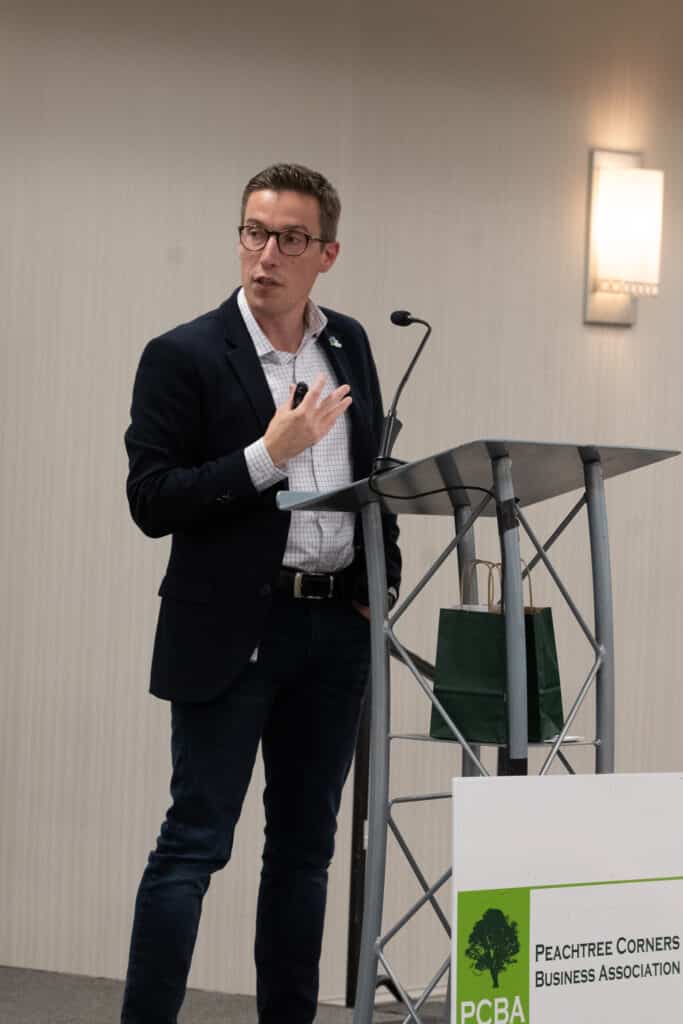
“That speaks to the importance of ensuring that we have a great community,” he said. “So at Partnership Gwinnett we work with all of our cities, and the county government as well, [on] a kind of a best-practices trip.”
He added that the peer tour allows everyone to know what the neighboring communities are doing and share the good news.
“We will take all of these elected officials, but also city staff, to different cities across the Southeast,” he said. “Last year, I believe they went to Huntsville, and have been to Greenville, Chattanooga — all cities that have done some really cool redevelopments that have taken their city to the next level. Our goal is to learn from them.”
Related
Read the Digital Edition
Subscribe
Keep Up With Peachtree Corners News
Join our mailing list to receive the latest news and updates from our team.
You have Successfully Subscribed!

From Boardrooms to the Himalayas: Vandana’s Journey to Purpose and Growing with Intention [Podcast]

Guardians of the Jukebox to Play the VoxStage on May 31

Brandon Branham Honored for Transformative Leadership in Peachtree Corners

Music Matters Productions Expands Peachtree Corners Headquarters

“Geek Culture” Shines at 2025 MomoCon

Celebration and Community: ICAGeorgia Wraps Up School Year with Two Festive Events

Vox-Pop-Uli Launches RED Initiative for Veterans’ Support

The PCBA Awards $500 to Light Up The Corners at After-Hours Event

Vox-Pop-Uli Launches RED Initiative for Veterans’ Support

The PCBA Awards $500 to Light Up The Corners at After-Hours Event

“Geek Culture” Shines at 2025 MomoCon

Celebration and Community: ICAGeorgia Wraps Up School Year with Two Festive Events

Guardians of the Jukebox to Play the VoxStage on May 31

Music Matters Productions Expands Peachtree Corners Headquarters

Brandon Branham Honored for Transformative Leadership in Peachtree Corners

From Boardrooms to the Himalayas: Vandana’s Journey to Purpose and Growing with Intention [Podcast]

Light up the Corners [Video]

Capitalist Sage: Business Leadership in Your Community [Podcast]

Cliff Bramble: A Culinary Adventure through Italy

Top 10 Brunch Places in Gwinnett County

A Hunger for Hospitality

THE CORNERS EPISODE 3 – BLAXICAN PART 1

Top 10 Indoor Things To Do This Winter

The ED Hour: What it takes to Remove Barriers from Education









